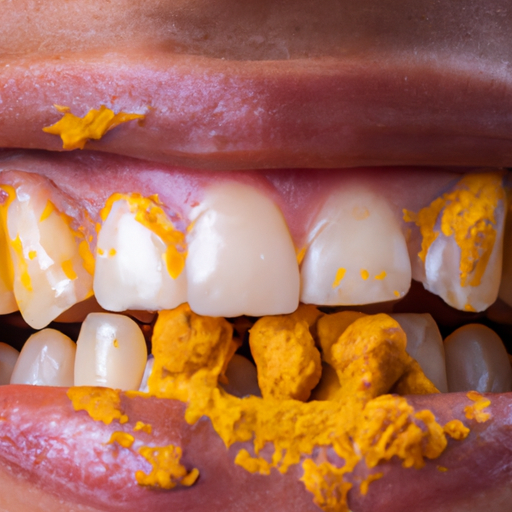Have you ever felt self-conscious about your smile because of yellow teeth? I know I have. It’s a common problem that many of us face, and it can be caused by a variety of factors such as aging, poor oral hygiene, or even certain foods and drinks.
But what if I told you that there might be a natural remedy that could help brighten your smile? That’s where turmeric comes in.
Turmeric, known for its vibrant yellow color and its use in cooking, has been gaining popularity as a potential solution for yellow teeth. Many people claim that turmeric can help whiten teeth and improve overall oral health. But is there any truth to this theory?
In this article, we will explore the potential benefits of turmeric for teeth whitening, its properties, how to use it, and any possible side effects. We will also discuss alternative natural remedies and the importance of consulting with a dentist for teeth whitening options.
So, if you’re curious about whether turmeric is good for yellow teeth, keep reading to find out more. Your bright and confident smile may be just a few natural remedies away!
Key Takeaways
- Turmeric contains curcumin, which has anti-inflammatory and antioxidant properties that can help prevent gum disease and relieve pain and swelling.
- Turmeric’s antimicrobial properties can fight bacteria that cause bad breath.
- Turmeric’s natural abrasive properties can remove surface stains on teeth.
- Excessive use of turmeric may temporarily stain teeth yellow and cause side effects such as staining and enamel erosion.
Understanding the Causes of Yellow Teeth
If you’ve ever wondered why your teeth aren’t as white as you’d like them to be, it’s time to dive into the causes of those pesky yellow stains.
There are several factors that can contribute to tooth discoloration. One common cause is the consumption of certain foods and beverages that have strong coloring agents, such as coffee, tea, red wine, and berries. Additionally, smoking and tobacco use can also lead to yellowing of the teeth.
Poor oral hygiene practices, like inadequate brushing and flossing, can allow plaque to build up on the teeth, causing them to appear yellow. Furthermore, certain medications, such as antibiotics and antihistamines, can cause tooth discoloration as a side effect.
While there are many home remedies for yellow teeth, it’s important to note that their effectiveness may vary. Some people claim that using baking soda or hydrogen peroxide as a toothpaste can help whiten teeth, but these methods should be used with caution as they may cause tooth sensitivity or enamel erosion. Oil pulling, a practice where one swishes oil around in their mouth, is also believed to have teeth whitening properties, but more research is needed to support this claim.
Now, let’s move on to the properties of turmeric and its potential benefits for achieving a brighter smile.
The Properties of Turmeric
One surprising fact about this ancient spice is that it has unique properties that might just leave you in awe. Turmeric’s been used for centuries in traditional medicine because of its many health benefits. When it comes to oral health, turmeric can be a game-changer. It contains a compound called curcumin, which has powerful anti-inflammatory and antioxidant properties. These properties make turmeric an excellent natural remedy for various dental issues.
Research has shown that curcumin can help prevent gum disease by reducing inflammation and fighting harmful bacteria in the mouth. It can also relieve pain and swelling associated with oral conditions like gingivitis. Additionally, turmeric’s antimicrobial properties can help fight the bacteria that cause bad breath, leaving your mouth feeling fresh.
Furthermore, turmeric can also help remove surface stains on teeth. Its natural abrasive properties gently scrub away plaque and discoloration, revealing a brighter smile. However, it’s important to note that turmeric can stain clothing and other surfaces, so it’s best to be cautious when using it.
The properties of turmeric make it a valuable ingredient for maintaining oral health. Its anti-inflammatory, antioxidant, and antimicrobial properties can help combat gum disease, bad breath, and surface stains. Now, let’s explore the potential benefits of turmeric for teeth whitening.
The Potential Benefits of Turmeric for Teeth Whitening
Enhance your smile’s radiance with the potential teeth-whitening benefits of turmeric. Many people are seeking natural remedies to brighten their teeth, and turmeric has gained attention for its effectiveness in this area.
Scientific evidence supporting turmeric for teeth whitening is limited, but some studies suggest that its active compound, curcumin, may have the ability to remove stains and improve the color of teeth. Curcumin, the main component of turmeric, has been found to possess anti-inflammatory and antioxidant properties. These properties may help reduce the buildup of plaque and prevent tooth discoloration caused by factors such as smoking, coffee, and certain foods. While more research is needed to fully understand the effectiveness of turmeric for teeth whitening, its potential benefits cannot be ignored.
To harness the teeth-whitening potential of turmeric, it can be used in various ways. One popular method is to create a paste by mixing turmeric powder with water or coconut oil, and applying it to the teeth for a few minutes before rinsing thoroughly. Another option is to use turmeric-infused toothpaste or mouthwash. However, it’s important to note that excessive use of turmeric may lead to temporary yellow staining on teeth, so moderation is key.
In the next section, we’ll explore how to use turmeric to whiten teeth effectively, ensuring optimal results.
How to Use Turmeric to Whiten Teeth
Discover the secret to a dazzling smile by unlocking the power of turmeric in whitening your pearly whites. Turmeric, a popular spice known for its vibrant yellow color, offers numerous benefits for oral health. Incorporating turmeric into your daily dental routine can help improve the appearance of yellow teeth and promote overall oral hygiene.
Using turmeric for oral health is simple and effective. One way to harness its whitening properties is by creating a homemade turmeric toothpaste. Mix turmeric powder with baking soda and coconut oil to form a paste. Gently brush your teeth with this mixture for two minutes, then rinse thoroughly. Another option is to apply a turmeric paste directly onto your teeth and leave it on for a few minutes before rinsing. This method can help remove stains and brighten your smile.
To add a level of sophistication to your oral care routine, try incorporating a turmeric mouthwash. Combine turmeric powder with warm water and swish it around your mouth for 30 seconds before spitting it out. This can help reduce plaque buildup and freshen your breath.
By using turmeric for teeth whitening and incorporating it into your daily dental routine, you can enjoy the benefits of a brighter smile and improved oral health. However, it’s important to be aware of possible side effects of using turmeric on teeth, which we will explore in the next section. So, let’s delve into the potential risks and side effects of using turmeric for whitening your teeth.
Possible Side Effects of Using Turmeric on Teeth
To fully understand the potential risks and side effects of incorporating turmeric into your dental routine, it’s important for you to be aware of how this vibrant spice can affect the health of your teeth. While turmeric is often touted for its effectiveness in whitening teeth, it’s crucial to consider the possible side effects and take necessary precautions.
One of the main concerns associated with using turmeric on teeth is its staining properties. Turmeric is a deeply pigmented spice that can leave yellow stains on your teeth if not used properly. Additionally, using turmeric on a regular basis may have long-term effects on the enamel of your teeth, potentially leading to increased sensitivity and erosion.
Safety concerns also arise when using turmeric as a teeth whitening remedy. Some users have reported allergic reactions, such as itching and swelling of the gums, after using turmeric. It’s important to note that these side effects may vary from person to person, and it’s always best to seek professional advice before incorporating any natural remedy into your dental routine.
Considering the potential side effects and risks associated with turmeric, it’s understandable that you may be interested in alternative options for teeth whitening. In the subsequent section, we’ll explore alternative natural remedies that can help you achieve a brighter smile without the potential risks associated with turmeric.
Alternative Natural Remedies for Teeth Whitening
If you’re looking for safer options to brighten your smile, there are alternative natural remedies that can help without the potential risks associated with using turmeric on your teeth.
One such remedy is baking soda. Baking soda has natural whitening properties and can gently scrub away surface stains on your teeth. You can create a paste by mixing a small amount of baking soda with water and brushing your teeth with it a few times a week. However, it’s important to note that baking soda should be used in moderation as excessive use can wear down your tooth enamel.
Another natural remedy you can try is apple cider vinegar. Although it may sound counterintuitive to use an acidic substance for teeth whitening, apple cider vinegar has been found to effectively remove stains and kill bacteria in the mouth. However, it’s crucial to dilute the vinegar with water before using it as a mouthwash to prevent damage to your tooth enamel.
Incorporating these natural remedies into your oral care routine can help improve the whiteness of your teeth. However, it’s essential to remember that these remedies may not provide the same level of whitening as professional treatments. Therefore, it’s always a good idea to consult with a dentist for teeth whitening options that are safe and effective.
Consultation with a Dentist for Teeth Whitening Options
When you schedule a consultation with a dentist, they can provide you with a range of teeth whitening options tailored to your specific needs, ensuring a brighter and more radiant smile. Dentists are professionals who have extensive knowledge and expertise in oral health, including teeth whitening.
During the consultation, the dentist will carefully examine your teeth and discuss your desired outcome. Based on their evaluation, they will recommend the most suitable teeth whitening treatment for you.
Professional teeth whitening is often the most effective and safest option for achieving a whiter smile. Dentists use advanced techniques and high-quality whitening agents that aren’t available over the counter. These professional-grade products can remove deep stains and discoloration, resulting in a noticeable improvement in the color of your teeth.
There are different types of professional teeth whitening treatments available, such as in-office bleaching and take-home whitening kits. In-office bleaching involves the application of a concentrated whitening gel on your teeth, which is then activated using a special light or laser. This method can provide dramatic results in a single visit. Take-home whitening kits, on the other hand, involve custom-made trays and a milder whitening gel that you use at home over a period of time.
By consulting with a dentist and following their recommendations, you can achieve a whiter smile in a safe and effective manner. Professional teeth whitening is a reliable option that can help you regain your confidence and enhance your overall appearance.
Frequently Asked Questions
Can turmeric completely remove yellow stains from teeth?
Turmeric is not proven to completely remove yellow stains from teeth. However, there are turmeric alternatives and natural teeth whitening methods that can help brighten your smile. It is best to consult with a dentist for personalized advice.
Is turmeric safe to use for teeth whitening if I have sensitive teeth?
Turmeric can be safe for teeth whitening even with sensitive teeth. Its natural anti-inflammatory properties can help reduce sensitivity. However, if you’re concerned, there are alternatives like baking soda or activated charcoal that also offer teeth whitening benefits.
Can turmeric be used for teeth whitening in children?
Using turmeric for children’s teeth whitening is not recommended. However, turmeric has various benefits for oral health, such as its anti-inflammatory and antimicrobial properties. There are alternative natural teeth whitening methods available for children.
How long does it take to see results when using turmeric for teeth whitening?
It typically takes several weeks to see noticeable results when using turmeric for teeth whitening. Turmeric is known for its natural teeth whitening properties and can help with stain removal.
Are there any specific precautions I should take when using turmeric for teeth whitening?
When using turmeric for teeth whitening, it is important to take certain precautions. While turmeric has many benefits, it can stain surfaces and cause temporary yellowing of teeth.
Conclusion
In conclusion, after thoroughly examining the properties and potential benefits of turmeric for teeth whitening, it’s clear that incorporating this natural remedy into your oral care routine may help combat yellow teeth.
However, it’s important to note that individual results may vary and there are possible side effects to consider. Therefore, it’s always advisable to consult with a dentist for personalized teeth whitening options.
Remember, maintaining a healthy oral hygiene routine and seeking professional guidance are key to achieving a bright, confident smile.










